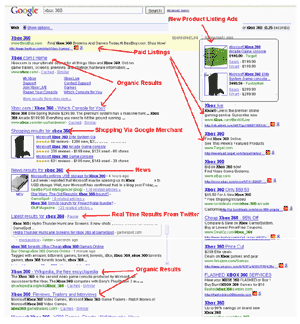Shift Happens: SEO Alone is not Enough

When it comes to search engine optimization (SEO), one truth is everlasting: The landscape is continually changing. And often, when it changes, the resulting shift in rankings can be seismic. Google's announcement of Caffeine is one example. The new partnership between Microsoft Bing and Yahoo! aims to provide a long-term competitor to Google and will impact search results across many major Web properties.
For an example of search's ever-changing environment, look no further than a popular search on Google. Search for "Xbox 360" (click image below for larger view) and you will see more than just organic results from websites that mention those keywords. A broad range of content appears, including news, paid advertising, shopping feeds and social media results, including user updates from Twitter. This means that publishers and merchants need to concentrate on more than just increasing organic search placement for an Internet marketing plan to succeed.
Search Basics
Several factors have traditionally produced consistent SEO results. Content is still king, in many ways. Compelling content with proper keyword density and keywords highlighted in titles and meta tags remains very valuable to improving search engine rankings. Link building - inbound and outbound - adds strength to your site in the eyes of search engines, giving your site credibility and respect. Site structure is also important - if it's easy for search engines to index your content, rankings are not only more easily achieved but longevity can result, too.  Social and SEO
Social and SEO
As it stands today, no shift in search is more important or prevalent than social media. Every day, millions of people communicate with social media tools like Facebook and Twitter. Reaching these people can be a critical component of any successful online marketing campaign. However, every social media strategy needs to be more sophisticated than simply starting a Twitter page and posting your company's latest specials.
Social media and SEO marketing programs can strengthen each other. A high-quality social media campaign that is interactive and engages audiences can improve search engine rankings on two fronts - both in organic listings and as a source of inbound links. At the same time, applying smart SEO practices to social media content - such as keyword-rich updates - will increase the reach and visibility of your social media campaign.
It is important to use your social profiles as a way to attract attention by making sure that the right keywords are highlighted within them. This way, when a user searches for your brand, business or industry, your profile will appear in results. A nice side effect is that the more results containing your brand, the less room for your competition. It's also important to be active on your chosen social media sites. Along with making your own posts, build friends and followers by being involved in communities with similar interests. Social bookmarking tools like Digg and Delicious will help promote your own activities along with helping you share useful information with your followers.
Video and Feeds
Feeds have also become a valuable tool in the new SEO landscape. This includes RSS feeds with the latest company news, press releases, blog posts or social media updates. It can also include product feeds - another reason why it's important that your products and shopping carts can be easily indexed by search engines.
A relatively new concept is video SEO. Since acquiring YouTube, Google presents many video results in regular searches, often on the first page. Applying SEO concepts to videos can not only increase their placement in various searches but also improve the overall ranking of an entire website.
Getting Personal, and Local
Search engines are constantly looking for ways to differentiate themselves from the competition. One way has been attempting to deliver individual users with as much personalized content as possible. Localized search results have become increasingly expected by users in recent years, as they seek information relevant to their specific geographic area. Even as a small business, it might make sense to have offices (or even phone numbers) in different parts of the country or world to help improve search results in localized searches.
Beyond localized searches, search engines are continually looking for ways to drill down searches with results as individualized as possible. The new Google Personalized Search is just one example of this. Not only are search engines taking factors such as location into account when delivering results, they are also considering previous search history and other sites users have visited in the past. The reality is that, in many cases, no two searches will produce exactly the same results.
Because of concepts like personalized searches, it's important to feature customized content. Microsites that are targeted to specific areas of interest, demographics or geographic regions are one way to do this. You might build a microsite for teens, or city and state pages for different parts of the country. These sites also give places to post fresh content on a weekly or even daily basis - something that search engines like to see.
The bottom line is that basic SEO concepts are still critical, just not by themselves. In order for SEO campaigns to be truly effective they need to be paired with smart marketing campaigns that involve every aspect of a company's online brand. As with any marketing campaign, it's very important to think about your target audience when designing an SEO campaign and how and where you can most effectively reach them.






